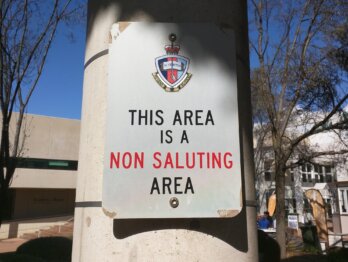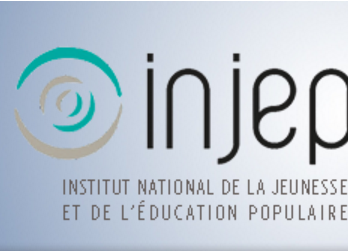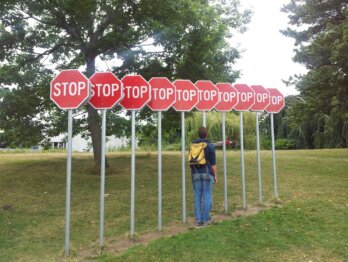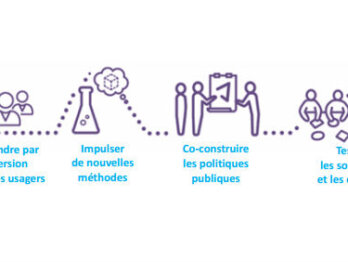What if government made public service with citizens rather than for them?
This blog was authored by Elizabeth Grosdhomme, Elisabeth Grosdhomme Lulin, Directeur Général de Paradigmes et Caetera
The involvement of the ‘third sector’, which is neither government nor private sector, in the provision of public services, is nothing new. Private establishments providing public services which were previously run by religious communities have for over a century played a major role in the education and healthcare fields. Civil society organisations are already fully involved in government action in the social services sector, in environmental protection and even in development aid or international relations. Moreover, sponsorship by businesses, but also by private individuals, is now providing essential support for cultural policies.
The phenomenon has been around for a long time and is constantly expanding, resulting in the rising operational, financial power and influence of the major players in the third sector. At the same time, contractual relationships with the public authorities are becoming with increasingly sophisticated
We are now seeing the emergence of two novel forms of civil society participation in public service provision: firstly collaborative government and secondly data ‘up-sourcing’.
Collaborative government
Collaborative government includes schemes set up by governments to mobilise citizens and users to co-produce services. For example, when the French President called for a Citizens’ Reserve to go into schools and support teachers, this was a direct request to each of us to contribute to schools. Over three months 4 600 volunteers have signed up via the website to offer their time and skills.
Another classic example is the Neighbourhood Watch scheme set up in over 3 000 communes and districts, through which the police or the gendarmerie call upon local residents to be keep an eye on their neighbour’s homes and the neighbourhood. This is not about sub-contracting to a private police force or outsourcing to a specially created body, but is simply an appeal to the goodwill and cooperative spirit of all concerned.
There is no doubt that these participatory models will become more widespread in the future, since they meet a need on the part of the public authorities and satisfy a desire of ordinary citizens. On the citizens’ side, sometimes as a result of disappointment with public institutions and sometimes from an aspiration of personal achievement, there is a desire to act, to tackle the problems of modern society, rather than waiting and suffering in silence. On the government side, there is a growing discrepancy between resources and social needs, and also a recognition of the inadequacy of traditional forms of government action in front of contemporary challenges.
However, this convergence of interests will not be sufficient to ensure the success of these collaborative models. Three further ingredients are needed:
- First of all, an organisational set-up to both enable citizens to get involved and public officials to keep control of the system. In order to facilitate citizen involvement, it will be necessary to define what sort of contribution they can make, which will vary in both form and content, from the most accessible to the most demanding, depending on capacity and availability on both sides. In order to ensure overall consistency and continuity and to cultivate a sense of pride and commitment on the part of public officials, they must keep strict control over strategic functions. This can be learnt and modelled, but it should not be improvised.
- Next, a debate on what can be done to motivate citizens. A collaborative system will not be self-sustaining unless a large number of people participate and not just those who are most altruistic. Here again, recurrent themes are emerging: ‘nudge’ schemes which make ‘virtuous’ behaviour the easiest solution by default; ‘gamification’, that is to say anything that can help to make involvement a fun, gratifying and enriching experience and, lastly, social currencies, which are a reward which is not directly financial, with a non-monetary but nevertheless tangible value, that will reward people for their commitment.
- Lastly, a new dimension to political leadership, in which the government will no longer draw up detailed plans for the countless types of public services on the basis of a mandate from the electorate. Rather it will inspire, motivate and encourage every member of the community to get involved in serving the public good, to embody the feeling of belonging to a society in which everyone is prepared to contribute.
Data up-sourcing
The other new aspect of civil society involvement in the design and provision of public services is the gathering and use of data.
For example, by allowing the Waze app to gather mobile phone location data, motorists can contribute towards real-time road traffic modelling and, as a result, especially in urban areas, help to optimise traffic regulation. Although Waze is a private operator and is in fact a subsidiary of Google, it works in partnership with the public authorities in various cities that are particularly affected by traffic problems, such as Rio de Janeiro in Brazil.
Another example: in several American cities and notably in San Francisco, the municipal health inspection services have acquired algorithms that search websites such as Yelp or TripAdvisor where consumers leave comments and opinions on the establishments where they have eaten. The algorithm analyses the comments and identifies those restaurants that have repeatedly received negative comments about cleanliness and food quality. The limited number of inspection staff can then be deployed appropriately to those establishments presenting an identified risk.
In other cases, the tables are turned and it is the government that collects or produces the data and a third party adds further data and uses them to improve the public service. For example, the start-up Jobijoba’s aim is to enrich job offers and jobseekers ads on the Pôle Emploi (French Job Centre service) website: by searching hundreds of other websites (ranging from Le Bon Coin to Monster.com, not forgetting the local media), it will first of all collect job offers that the government service has missed – which will eventually double the number of jobs on offer. Then, following a semantic analysis of the ads, it will give advice to both jobseekers and recruiters. In that way, it will be able to guide jobseekers towards new areas of work on the basis of the qualifications on their CVs or suggest that they broaden their search to a particular region where there are job offers matching their skills. In the case of companies, it could point out that a particular criterion on their job description is putting people off or that other companies seeking to fill a similar post define the skills required differently.
In other words, a new form for civil society participation in public service provision can be found in the collective intelligence created by data sharing and processing. It works both ways: on the one hand via the ‘open data’ movement, where the government makes its data available for civil society to work with and invent new uses to enhance it. On the other hand, there is the capacity that each of us has to collect and generate information which, when brought together and interpreted, will make government action more effective.
Whether it is a question of collaborative government or data up-sourcing, the methodologies involved are still in their infancy. They are sufficiently developed for us to see the prospects offered by these new ways for civil society to participate in public service provision, but still too immature to enable us to assess all the issues involved, particularly in legal and political terms, or to find solutions for all of them. That is our task for the future.











